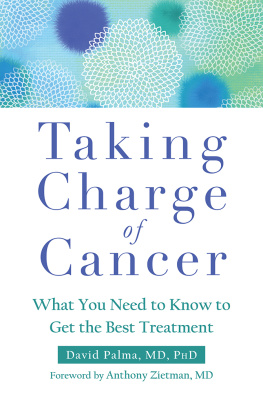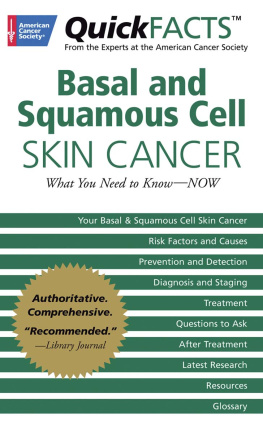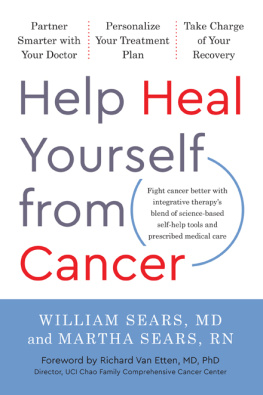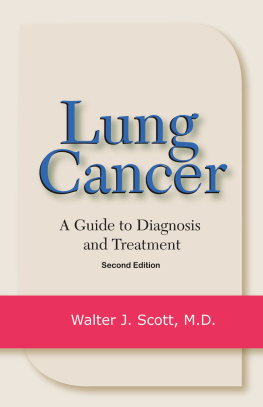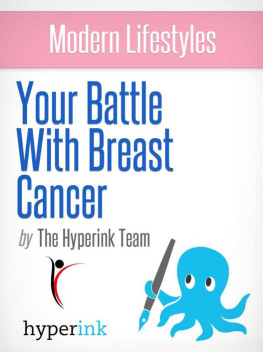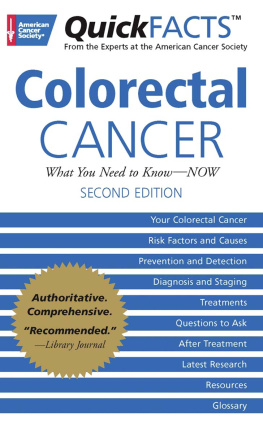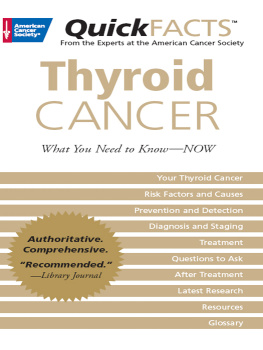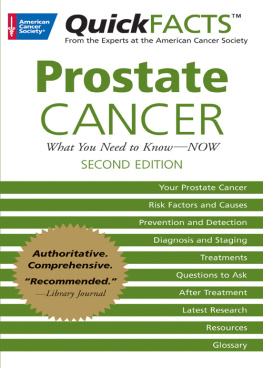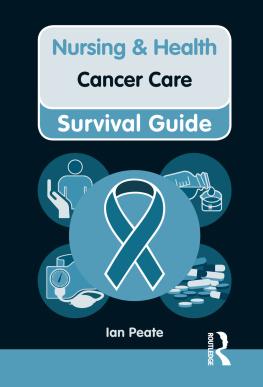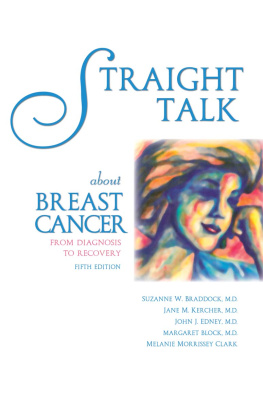
Note to Readers
All patient stories in this book are true. However, to protect anonymity, identifying details have been changed and some stories have been merged into composite stories.
Disclaimer
This book is intended as an information resource for those wishing to know more about the importance of quality cancer care. It is accurate to the best of the authors knowledge and has been written in good faith. It does not provide specific medical advice of any kind. It should not be relied upon for any specific purpose, and no representation or warranty is given regarding its accuracy or completeness. The material is not intended to be a substitute for the advice provided by your doctor or health care providers. You are advised to discuss all issues with your doctor. The final decisions about your medical care should be made between you and your doctor. The author and publisher disclaim all liability related to the use of this book. All opinions provided in this book are solely those of the author and may not represent the opinions of any of his associated institutions or hospitals.
Distributed in Canada by Raincoast Books
Copyright 2017 by David Palma
New Harbinger Publications, Inc.
5674 Shattuck Avenue
Oakland, CA 94609
www.newharbinger.com
Cover design by Amy Shoup
Edited by Cindy Nixon
All Rights Reserved
Library of Congress Cataloging-in-Publication Data
This is a long-awaited book written specifically for patients sailing through the cancer journey, and is an invaluable resource for them to empower themselves in their cancer care.
Simon S. Lo, MB, ChB, FACR, professor and vice-chair for strategic planning of radiation oncology at the University of Washington School of Medicine, and internationally renowned expert in stereotactic radiation delivery and neurologic radiation oncology
David Palma has developed a refreshing resource for patients who must endure the complicated journey that comes with the diagnosis of cancer. He highlights what questions to ask, why certain tests are done, and where to look for potential mistakes that can affect their outcomes.
DrewMoghanaki, MD, MPH, director of clinical radiation oncology research at Hunter Holmes McGuire Veterans Affairs Medical Center
If you use a guidebook for a journey, you will need TakingChargeofCancer for a cancer journey. Cancer patients are overwhelmed with information related to the diagnosis, and commonly, it is confusing. Palmas how to approach to complex information is surely a brilliant guiding light
Tony Mok, MD, chair in the department of clinical oncology at the Chinese University of Hong Kong
David Palma has written a how-to manual that should be considered a must-have book for anyone with cancer. In clear and easily readable prose, Palma helps patients and their family members navigate the unfamiliar territory in which they find themselves after receiving a diagnosis of malignancy. With a combination of illustrative patient stories and well-explained medical evidence, the book provides authoritative guidance in a general sense, and also specific advice on where to find more information on an individual patients particular situation. I will recommend it to my patients and to my own family and friends diagnosed with cancer. I am sure they will gain comfort and reassurance from Palmas thoughtful insights.
Brian D. Kavanagh, MD, MPH, FASTRO, professor and chair in the department of radiation oncology at the University of Colorado Denver School of Medicine
Palma has provided important advice that is easy to read and understand. It is an essential read for any patient with cancer who is about to undergo any type of cancer therapy.
Robert J. Cerfolio, MD, MBA, FACS, FCCP, chief of thoracic surgery and director of the Lung Cancer Service Line at NYU Langone Cancer Center
To Cheryl, Kiara, Adam, and William
To Uncle Bob
Contents
Resources: Learning More About Cancer 30
Online Medical Dictionaries 30
Resources: How Reports Are Structured 68
Sample Patient Scenarios 73
Finding More Help for Pathology or Radiology Reports 88
Understanding Blood Test Results 89
Resources: Accessing Treatment Guidelines 131
Finding a Doctor 134
Resources: Calculating the Benefits of Systemic Therapy 183
Resources: Clinical Trial Directories 192
Resources: Survivorship Care Plans 203
Resources: Living Wills 217
If ever there was a time in which a patients guide to good cancer care was needed, it is now. We are long past the paternalistic age in which cancer patients implicitly trusted their local doctors and did as they were told. That may have been quite sufficient in an era when the treatment options were limited and there was little room for uneven care, but that is not where we are now.
We live in an age of great medical advances, which render a bewildering array of treatment options to patients. We live in an age of hypercommunication, in which information is pouring in from such a variety of sources that it is difficult to curate it, decipher it, and determine what is valuable and what is not. Within this cacophony of information, both doctor and patient can lose control, and the net result has been a very uneven quality of cancer care delivered. The very authoritative Institute of Medicine and a group of very determined researchers at Dartmouth College have documented how patchy the quality of cancer care can be in the United States by geographic region, by hospital, and by physician. Inevitably, this has consequences for patient outcomes and, in particular, the big two of survival and quality of life.
I will give you some examples from my own experience as a prostate cancer oncologist. Why is it the case that, in the United States, most men with very mild and early prostate cancers receive aggressive treatment, whereas in the United Kingdom, they are usually observed? Why are these US patients much more likely to undergo surgery in the Pacific Northwest than in New England? Why do reports from very experienced surgeons show low rates of complications, such as urinary incontinence, and yet national studies show rates of the same complications to be very high? The answers, sadly, may lie in dark places. Physicians prefer to do what they do. If a surgeon sees a patient first, then surgery may be the only treatment offered. Surgeons who perform an operation infrequently will not do it as well as those who work in high-volume centers. The payment structure in some health care systems may incentivize physicians to use one treatment over another, perfectly good, alternative treatment.
These are problems on the physician side, but what influences good care on the patient side? Firstly, patients may simply ask no questions and seek no confirmation of the initial recommendation. Or perhaps they seek therapies promoted in the media, not realizing that the evidence supporting their use may be very thin. The media always needs good health news stories in its dual role as informer and entertainer, frequently presenting premature data with hyperbolic claims of miracle cures. Alternative therapies abound in prostate cancer, and although few have strong evidence to support them, there is everything out there from a gigantic, unregulated nutritional supplement industry to a deafening Internet buzz promoting these therapies. More than 50 percent of prostate cancer patients are taking a supplement or altering their diet in response to this.
A few years ago, I had a patient with a tiny prostate cancer that did not threaten him at all and really should have been left alone. He understood this and planned to simply be observed, but he couldnt resist the siren call of Chinese herbs. Well, whats the harm? These he brewed and drank in enormous quantity and concentration with the result that his liver stopped working and he needed a liver transplant. What was worse, in order to be on a waiting list for a precious donor liver, he had to have no other major illnesses and, specifically, he had to be free of any cancer. Thus, I needed to treat his prostate cancer in order to allow him to receive his transplant, which he wouldnt have needed if he hadnt taken the Chinese herbs that he never needed in the first place!
Next page
